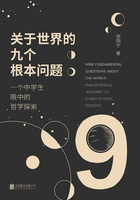
Ⅱ.The Tradition of Subject-Object Dualism
Since Descartes 'philosophy began, the distinction between“substance” and “spirit” has been made, which inevitably leads to a cognitive crisis: in this case, how should the subject present the object completely and objectively? After all, in the famous thought experiment“brain in a vat”, how should people know if their knowledge as the subject has been deceived?
Here, it is necessary to briefly introduce the dualism of subject and object. For example, when we look at a pill, we are looking at the target,which is generally called “pill”. In traditional epistemology, the observed and recognized target is called “object”. In the process of watching and taking pills, this action is given by “I,” or I am looking at this object (object).At this time, I'm called the subject (this example only provides some attributes of the subject). Here's the question. In this process of cognition and perception, how do I know that this phenomenon called “pill” that I know is exactly the same as the “pill” itself ? Am I just a brain soaked in a container, being stimulated by electric signals, and producing a false reality? If my mind wants to deceive me and I know nothing about it, how can I break my illusion? Or in a philosophical way, how can the subject objectively present the object?
Under such a historical background, it is impossible for any epistemological advancement to be established with “legitimacy”(in short, false knowledge is meaningless) unless this most essential question is answered or dispelled. The first great philosopher who really pushed forward this fundamental problem was Kant, and there is no doubt that Husserl and even Brentano and Lotze before him were influenced. Therefore, if we want to find the possibility and historical origin of phenomenology in the history of philosophy, we should first briefly review Kant's contribution.